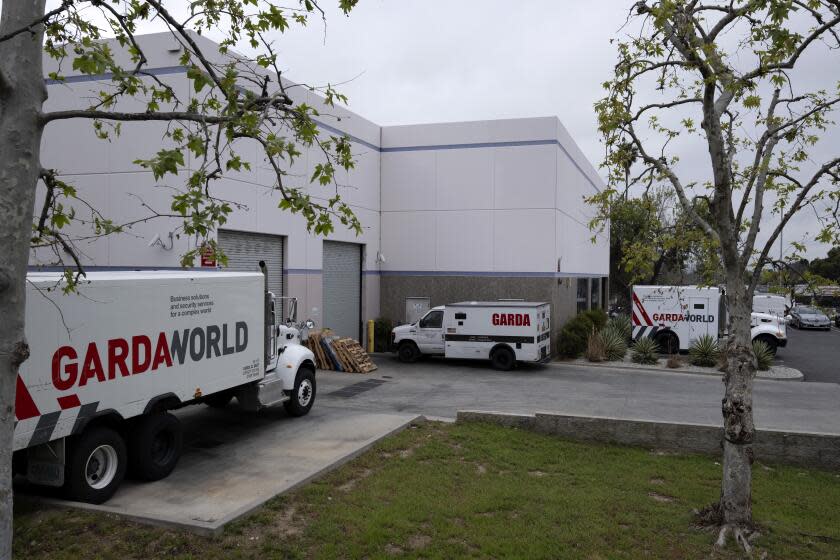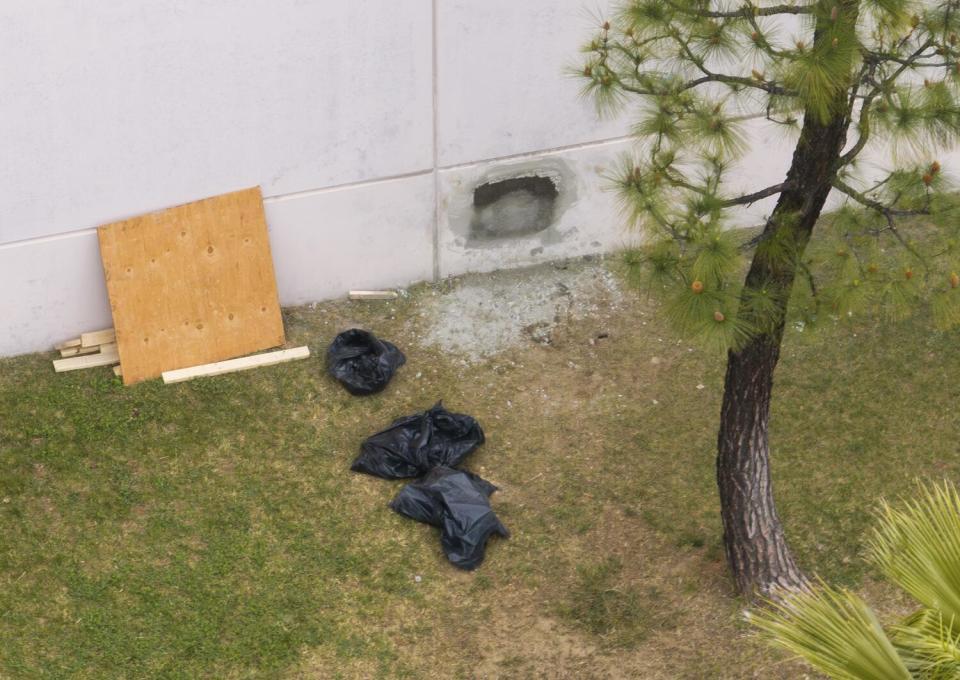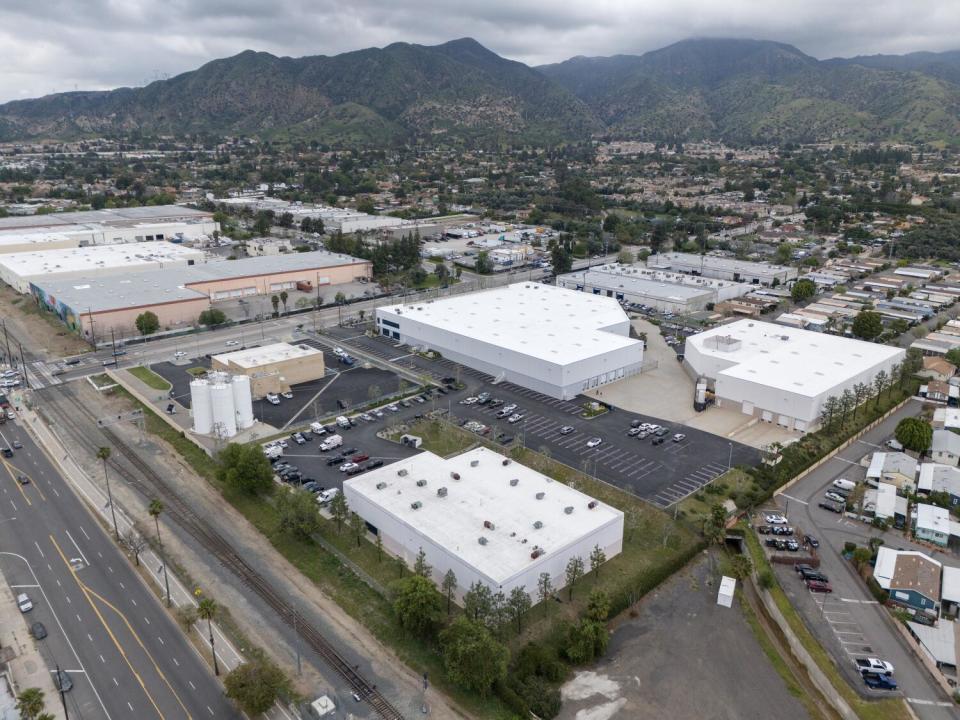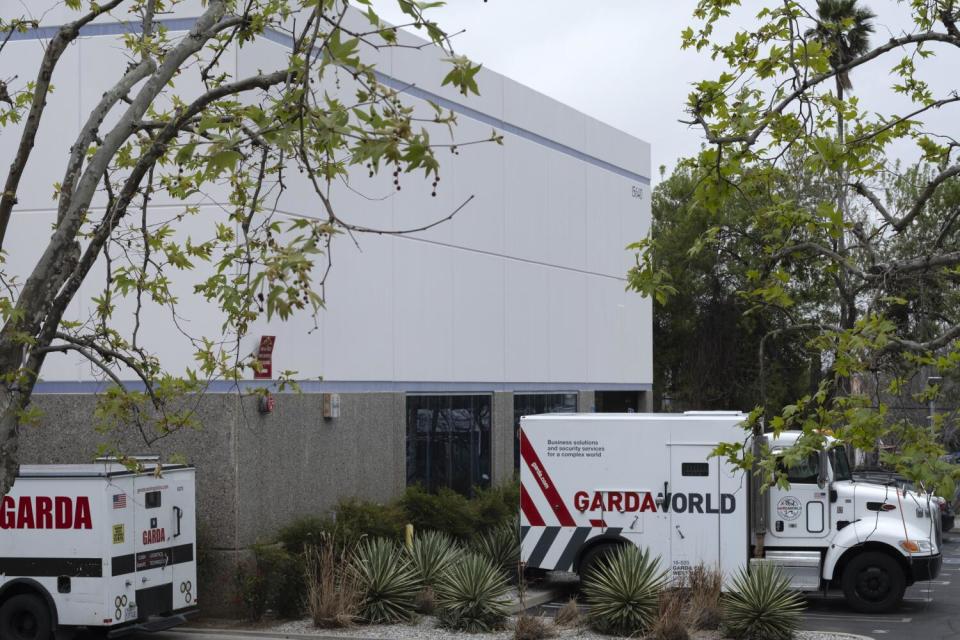GardaWorld heist: The reason $30 million was in a Sylmar warehouse and not a bank

The biggest cash heist in L.A. history didn't go down at a bank.
It occurred at a warehouse in a quiet corner of Sylmar.
Early on March 31, thieves breached the roof of a Roxford Street facility maintained by security services company GardaWorld and stole as much $30 million from the vault.
The Easter morning heist drew sudden attention to an industry — cash logistics — that normally keeps a low profile and performs some of the roles traditionally done by banks, such as storing huge sums of money.
GardaWorld and its competitors, among them Loomis and Brink's, retrieve commercial bank customers' cash in armored vehicles and bring it to facilities like the one in Sylmar, where it is organized and held on behalf of the financial institutions.

In theory, such warehouses should be easier to secure than banks, with far fewer locations to guard, entry tightly restricted and no tellers to hold up.
Often located in suburban locales near major cities, the storage buildings are akin to grain warehouses, said Larry Harris, former chief economist of the U.S. Securities and Exchange Commission.
"The money moves in and out all the time as different entities need it," said Harris, a professor at the USC Marshall School of Business. "These guys are specialists. Not withstanding the latest incident, it is probably more secure."
GardaWorld, a Canadian company whose U.S. headquarters are in Boca Raton, Fla., hasn't worked solely with financial institutions such as Bank of America. Its clients have included McDonald's, Starbucks and Trader Joe's, according to news reports, and the legal marijuana industry. Businesses rely on GardaWorld to organize and distribute cash to their stores so that they are able to carry out basic functions, like making change for customers.
In a typical vault in the cash management business, a client's money is sealed in protective plastic wrapping, placed on pallets and segregated from others' funds, said Jeffrey Zwirn, a longtime security consultant. GardaWorld has not disclosed which of its customers' money was stolen in the Easter crime or to what extent it was insured. The Los Angeles Police Department and the FBI, which are investigating the burglary, have said little about their inquiry.
L.A. police responded to three separate alarms at the Roxford property on the day of the theft — and another around 11:30 p.m. on March 30, according to an LAPD call-for-service log obtained by The Times. Despite the officers’ presence, the criminals were undetected. And during at least one of the responses by a patrol car, GardaWorld was alerted, but the company did not initially register the intrusion, The Times has reported.

GardaWorld did not respond to interview requests.
The burglary has only heightened concerns about security protocols at the company on the heels of an acquisition spree that saw its dramatic expansion.
Its cash management business has been targeted by thieves on many occasions over the years — and some of those criminals have had ties to the company, including in high-profile crimes in Riviera Beach, Fla., in 2012, and San Leandro, Calif., in 2022.
"They sort of came out of nowhere and just grew exponentially," said security industry veteran Jim McGuffey, who held senior positions at Brink's and Loomis. "The problem, in my opinion, is that with such fast growth, you are going to have both customer issues and security issues."
Cash and controversy
Armored vehicles with "GardaWorld" painted on the sides in blocky text have become an increasingly common sight in the Southland.
Founded in 1995 and headquartered in Montreal, GardaWorld has long dealt with controversy. In 2008, an employee at a Pasadena subsidiary of the company filed a lawsuit that alleged founder and CEO Stephan Cretier "threatened to kill any executives or the family of any executive who leaked information about the company’s financials to the press," the Los Angeles Business Journal reported. GardaWorld denied the allegations, but it was subsequently reported that Cretier acknowledged in a deposition that he'd threatened employees — though he said he was joking, and denied threatening to kill workers' kin.
A three-part 2020 Tampa Bay Times investigation alleged numerous safety issues with GardaWorld's vehicles, substandard security procedures and the disappearance of customers' cash from storage facilities, while detailing fatal accidents involving the company's drivers. Citing interviews and legal records, the report said that some vaults were "chaotic places where employees routinely ignored protocol and lost money," adding that certain ones "were rife with unsolved thefts."
In response, the privately held GardaWorld denied many of the findings — it said in part that the investigation was "baseless and unfounded, and relies on outdated, misleading data and conclusions" — and threatened to sue over the coverage, the Tampa Bay Times reported. As for the issue of storing banks' money, the company told the publication that it uses "industry-leading controls" to "monitor the constant movement of our clients’ money.” The company explained that the financial institutions' assets "are never at risk because the money is insured," according to the investigation.
Read more: Police responded to alarm around time of $30-million L.A. heist, but thieves were undetected
GardaWorld offers not only cash logistics but also highly specialized security services, including for ports, embassies and mines, among other venues. The company has diversified its expertise in part via acquisition: In the 2010s, it purchased security firms Intercon Security, Aegis Group and Whelan Security, among others. In the first eight months of 2022, it bought 10 more companies for about $1 billion.
But cash is still at the heart of the company's business. And although the overall size of the U.S. cash economy is shrinking — from about 31% of transactions in 2016 to about 18% in 2022, according to the Federal Reserve Bank of San Francisco — it remains vital to many industries, said Brandon Parsons of Pepperdine Graziadio Business School.
Though the COVID-19 pandemic has led some restaurants, convenience stores, retail shops and other venues to stop accepting cash, "if you can't make change, you don't have a transaction," Parsons said. "Businesses still need to accommodate these customers."
Read more: Police responded to alarm around time of $30-million L.A. heist, but thieves were undetected
And even as consumers embrace digital payment services such as Zelle and Venmo, the cash management industry is growing, Parsons said.
Banks outsource cash logistics because it is more cost-effective to hire the likes of GardaWorld to maintain a vault — which must be staffed, insured and stocked with expensive security equipment — than to do it in-house. For their part, the cash management companies are able to build large vaults that can accommodate the money of multiple financial institutions and other commercial customers, achieving economies of scale.
Over the 10-year period beginning in 2014, GardaWorld's annual sales increased about 291% to about $4.4 billion, according to data company FactSet.
"With healthy pipelines of new growth opportunities across our various business units, we expect organic growth momentum to continue building up in the coming year," GardaWorld said in January.
Cash vaults targeted
You won't find many details about the security protocols of cash vaults on the websites of GardaWorld and other companies in the business. That's by design — the industry works to conceal much about the facilities, lest they become even bigger targets.
Zwirn, who has spent 40-plus years in the field and trains law enforcement personnel, called the Roxford building "a high-risk burglary and robbery premise" requiring a complex security system. He said such a property should include two separate alarm systems whose signals are transmitted to different security command centers, sensors that can detect the presence of radio frequency signal jammers, and motion-sensing cameras that would alert personnel to the presence of people on the roof.
What's more, Zwirn said, the security system at a property like the one in Sylmar "has to be constantly tested — probably on a monthly basis — to make sure everything works."
Security expert Aria Kozak said that false alarms at the Roxford property — the LAPD responded to 13 alarm calls at the building in the year prior to the heist — could have been part of a gambit by the thieves to test guards' and law enforcement's response.
The thieves may have "generated false alarms to see if the guard is going to be alert," said Kozak, chief executive of security services company Elite Interactive Solutions. He said that false alarms could have lulled personnel into a sense of security. "There are so many alerts that ... you probably say to yourself, 'Eh, it's another false alarm,' when in fact ... a real thing happened," he said.
Because information about these facilities is closely guarded — including their location and the details of their security apparatuses — the thieves who target them often have inside information, according to news reports. That's been the case at GardaWorld.
On Sept. 15, 2012, two robbers packing AK-47s stormed into a GardaWorld cash storage facility in Riviera Beach, Fla. They jabbed a rifle into the back of Hjalmar Towns, a company supervisor, and grabbed a Ruger pistol from his waistband.
Within a few minutes, the thieves were loading a Chevrolet S-10 with cash. They made off with a little more than $3 million.
One of the robbers had repeatedly struck Towns in the head with the butt of an AK and tied him up. But what FBI agents investigating the heist would eventually discover was that Towns had helped mastermind the job. Authorities learned that Towns had felt the time was right for the robbery because GardaWorld was scheduled to move its operations to a more secure property, according to court documents. And he'd told his accomplices that if they made a show of force, none of the company's employees would risk their lives.

Less than a year after the robbery, Towns tried another in West Palm Beach. Armed with a rifle, he tried to knock off a GardaWorld armored vehicle carrying $1.5 million. Towns fired two rounds, nearly hitting a GardaWorld worker, and fled without taking cash. He was stopped by police and eventually pleaded guilty to charges related to the attempted heist, court records show.
Towns, who had tried to deceive investigators by saying his assailants in Riviera Beach were Haitians speaking Creole, was sentenced to six and a half years in prison for the robbery — and more than 14 years for the failed armored car job. His gun-toting associates in the storage facility heist also received lengthy sentences.
McGuffey, who heads a security consultancy, said that the cash management industry has been hurt by companies taking "severe shortcuts," such as requiring employees to work longer hours, squeezing wages and skimping on personnel.
"I just think there are going to be a lot more crazy things like this happening, because of shortcuts to increase profit at the expense of safety and security," he said. "That's what happened in the industry, and it's a sad commentary."
Times researcher Scott Wilson contributed to this report.
This story originally appeared in Los Angeles Times.

 Yahoo Finance
Yahoo Finance 